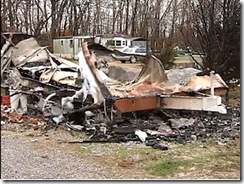The Boner of the Week! is awarded every Monday to the most outrageous event, quote or story I read about this week.
Usually I discuss outlandish or erroneous quotes in the Boner of the Week! segment. This time, let’s tackle an event.

At first glance, this appears to be a fire department and government politics problem. “On further review,” to quote the highbrow program Monday Night Football, I believe the Boner of Week! occurred when the family opted not to pay–what now appears to have been—a pretty important ‘insurance” bill before their house fire occurred.
Here’s my rationale:
1) They don’t live inside the city in question and.
2) Homeowners inside the city boundaries pay taxes for fire protection. Those outside are asked to pay a small fee to receive house fire support.
3) The family opted not to pay the fee, in essence declining the city’s coverage plan.
Don’t think I’m heartless. We’re experiencing a similar situation personally. Nearly ten years ago my in-laws met with me to discuss long term care insurance. My father in law, a smart man who’s always been a good friend, was vehemently opposed to it.
He said, “I’m not paying for that overpriced insurance. It’s a rip-off.”
Yesterday wife returned from Detroit, where she was helping my mother in law decide on options for home health care, because he’s suffered a major stroke. My mother in law is meeting with elder law attorneys, looking for ways to cut down on costs while keeping his quality of life high.
There aren’t many options now, because they made a critical decision back then to decline coverage.
It’s fair to assume that my in-laws will now spend about $70,000 per year (or more) of their own money on his care. Just like this family declined fire protection, had they purchased a long term care policy ten years ago, the break-even point on buying “that overpriced insurance” would have been only several months into the nursing home stay.
They chose to self insure. Now they’re faced with the consequences.
So is the Tennessee family that decided to opt out of fire “insurance.” They had a house fire and no fire protection coverage.
Maybe there are larger societal implications here. Maybe not. Maybe it’s that we live in a time when everyone seems to want someone else to take care of us. I believe this event is simply another wake up call: nobody cares about your situation more than YOU. Take care of yourself. Make your choice and live with the consequences.
What steps should you take to prevent making poor insurance coverage decisions?
1) Examine the probability of an event, such as a long term care situation or house fire.
2) Evaluate the cost to cover the probability
3) Decide whether it should be insured, or if you can handle it yourself.
In this case, seventy-five bucks might have saved a ton of personal property from this house fire. Often people will forego insurance because they don’t have the funds to pay the premium. Insurance is created specifically for times when funds are short. If there’s enough money to cover the unlikely need for fire protection and you follow some fire prevention safety tips, maybe it makes sense to avoid the fee.

Joe is a former financial advisor and media representative for American Express and Ameriprise. He was the “Money Man” at Detroit television WXYZ-TV, appearing twice weekly. He’s also appeared in Bride, Best Life, and Child magazines, the Los Angeles Times, Chicago Sun-Times, Detroit News and Baltimore Sun newspapers and numerous other media outlets. Joe holds B.A Degrees from The Citadel and Michigan State University.

I have to wonder whether the family OPTED not to pay the fee or whether they simply couldn’t afford it. I know it’s easy to think, “Who couldn’t afford $75?” but I personally know people who couldn’t. Hell, there have been times in my life when I wouldn’t have been able to pay. If the city sent out a notice saying “You have until X date to send your $75” and the family couldn’t, I’m sure it would be much easier to pass on the fee than give up groceries or electricity.
I don’t know if this was a matter of choice or circumstance, but I can imagine why a family renting a trailer may have financial struggles that make a $75 fee a luxury.
Thanks for stopping by, Andrea! I agree, they may not have “opted” to pay, and could have decided that it was a necessary expense to eliminate.
Actually, as I thinnk about it, I hope that’s the case. I don’t like thinking that someone who didn’t pay for a service that others have to pay for thought they’d receive that same service for free.
I also agree that there may be some larger social implications that are sad.
Or, maybe their house was so cheap they chose to ‘self-insure’, so to speak.
Remember, insurance is just the lottery in reverse!
We used to do this all the time with long term care insurance. If a client had enough to sustain themselves beyond the average need, many times we’d decide to forego insurance.
I hope they hadn’t been self-insuring. If they were, that means they were truly trying to get something for nothing when they made the call to the fire department.
Admiring the time and effort you put into your
site and detailed information you offer. It’s nice to come across a blog every once in a while that isn’t the same old
rehashed material. Excellent read! I’ve bookmarked your site and I’m adding
your RSS feeds to my Google account.
Oh, my goodness! I read the original story–didn’t know about the follow up!
Anyhow, on longterm care insurance–we have a plan in place for my parents, so it makes no sense for them to have the insurance. They are going to build an addition onto our house with its own kitchen, living room, 2 bedrooms, and 2 bathrooms, using the money from their current home. If they need care, the hourly rate for a caretaker is actually far lower than the cost at a nursing home. And we’ll be nearby to supervise. Their money can go much farther invested than it can as insurance to provide the same basic needs. And money is fungible. Insurance is not.
Of course, if I’m the one to have the stroke, they’re out of luck! But again, it’s about risk.
Thanks for the great comment, Jenny! Actually, if you look at the numbers, you’ll be surprised: people spend more on nurses at home than they do on nursing home care. The reason for this is economy of scale. One nurse can care for 20 people in the facility but only one in the home.
That’s a minor point, though. I love the degree to which you’ve tackled the issue AND I really like your plan. I get frustrated when parents thrust themselves on kids without thinking about the children’s lives….most people have a simple, “It’s not gonna happen to me” attitude until it’s too late, then everyone loses.